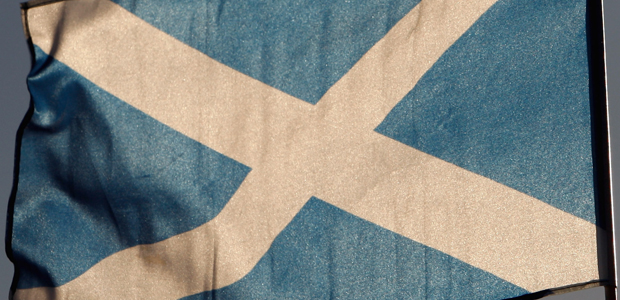Exclusive: Scots want more powers, not independence
Most Scots want to remain in the UK, according to a YouGov poll for Channel 4 News. But as YouGov President Peter Kellner writes, there is support for giving greater powers to Holyrood.

YouGov’s poll for Channel 4 News, conducted between last Thursday and Sunday, puts the SNP two points ahead of Labour when people are asked how they would vote in a general election. This is unusual – the SNP tends to far less well in Westminster elections than Holyrood contests, writes Peter Kellner.
Compared with the 2010 general election, the SNP has gained 17 points, to reach 37 per cent, while Labour is down seven, on 35 per cent. As in the rest of Britain, Conservative support is little different, while Lib Dem support is sharply down.
Yet when Scots are asked about the future of their country, their clear answer is: yes to more powers for Holyrood, no to full independence.
Click to download the findings of the YouGov/Channel 4 News poll (Excel file)
Alex Salmond, Scotland’s First Minister, wants his fellow Scots to have three options: the status quo, “devo-max” and full independence. (Under devo-max, Holyrood would have far greater powers, especially over taxation and public spending, but Scotland would remain part of the UK.) Salmond proposes that voters are asked two questions: the first pitches the status quo against devo-max, while the second pitches the status quo against full independence.
On the first question (the wording is roughly what Channel 4 News thinks Salmond wants to put on the ballot paper, 58 per cent of those expressing a view agree that “there should be a further significant devolution of all financial matters to the Scottish parliament while defence and foreign policy remain reserved UK issues”; 42 per cent disagree.
On the second question, 39 per cent agree “that the Scottish government should negotiate a settlement with the government of the United Kingdom so that Scotland becomes an independent state”, while 61 per cent disagree.
Read more: What if Scotland chooses independence?

This 3-2 margin against independence is in line with most polls in recent years, even though the question this time has been posed slightly differently. Adding in the emollient phrase, “negotiate a settlement”, does not provide as big a boost to the independence cause as Salmond might hope.
As might be expected, SNP voters agree overwhelmingly with both statements, while the rather fewer Tory voters are just as fervent in disagreeing with both statements.
The swing voters this time – who will have a decisive say in any referendum campaign – are the Scots who have stayed loyal to Labour. By 59-41 per cent they support devo-max, but by 82-18 per cent oppose independence. (The figures for Lib Dem voters are similar to those for Labour voters, but there are very few of them.) If Labour supporters continue to hold those views, it is hard to see how David Cameron can resist change if devo-max is offered as a referendum option – or how Salmond can win full independence this time round.
FactCheck: Does Scotland look bonnie to foreign investors?
As to the immediate bones of contention between Salmond and Cameron – when the referendum should be held, and whether it should offer two options or three – Scots are also divided. Thirty-eight per cent side with Cameron and want the referendum held this year or next, while 33per cent share Salmond’s view that it should be held in 2014. (Four per cent want it held even later, and 12 per cent don’t want a referendum at all.)
Regarding the two-option versus three-option debate, 43 per cent want a straight choice between the status quo and independence, while 46 per cent want to add in the option of devo-max. Although this debate has been going on for some time among Scotland’s chattering classes, it has now started being aired more widely and more intensely. Attitudes to it may change in the weeks ahead, as the talks between Scottish and UK ministers progress.
As far as Scottish public opinion is concerned, there is as yet no clear winner and no clear loser as to what precise form most people want the referendum to take.
Peter Kellner is president of the YouGov polling organisation
-
Latest news
-
Laughing Boy: New play tells the tragic tale of Connor Sparrowhawk5m

-
Sewage warning system allows some of worst test results to be left off rating system, analysis shows3m

-
Post Office inquiry: Former CEO didn’t like word “bugs” to refer to faulty IT system4m

-
Israeli soldier speaks out on war in Gaza12m

-
PM’s defence spending boost should be ‘celebrated’, says former Armed Forces Minister4m

-




